MEETING OF THE POPE WITH ECCLESIAL MOVEMENTS AND NEW COMMUNITIES May 30, 1998
S. John Paul II
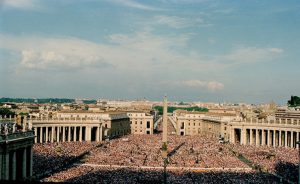
Saint Peter Square, May 30, 1998 *
Due to space requirements, we publish here below only the article that refers to the Neocatechumenal Way that “L’Osservatore Romano” published on May 29, 1998.
In the early Church, when the world was pagan, the one who wanted to become a Christian had to start a “catechumenate”, which was an itinerary of formation to prepare for Baptism. Today the process of secularization has caused many people to abandon the faith and the Church: that is why an itinerary of formation to Christianity is necessary. The Neocatechumenal Way is not a movement or an association, but an instrument in parishes at the service of bishops to return to faith so many people who have abandoned it. Started in the 1960s in one of the poorest neighborhoods of Madrid by Kiko Argüello and Carmen Hernández, it was promoted by the then Archbishop of Madrid, Casimiro Morcillo, who found in that first group a true discovery of the Word of God and an action practice of liturgical renewal promoted precisely in those years of the Council. Given the positive experience in the Churches of Madrid, in 1974 the congregation for Divine Worship chose the name “Neocatechumenal Way” for this experience. It is a path of conversion through which the riches of the Gospel can be rediscovered. In these years, the Camino has spread to 850 dioceses in 105 nations, with 15,000 communities in 4,500 parishes. In 1987 the international missionary seminary “Redemptoris Mater” was opened in Rome, welcoming young people who have matured their vocation in a Neocatechumenal Community and who are available to any part of the world. Successively many bishops have followed the experience of Rome and today in the world there are 35 diocesan missionary seminaries “Redemptoris Mater” where more than a thousand seminarians are being formed. Recently, responding to the Pope’s call for the New Evangelization, many families who have traveled the Camino have offered to help the mission of the Church, starting to live in the most secularized and de-Christianized areas of the world, preparing the birth of new parishes. missionaries. At the beginning of the meeting, after Cardinal Stafford’s welcoming words, they gave their experience: Chiara Lubich, Kiko Argüello, Mgr. Luigi Giussani and Jean Venier. Kiko Argüello’s intervention on the occasion of the meeting of the Holy Father with the Ecclesial Movements and the New Communities.
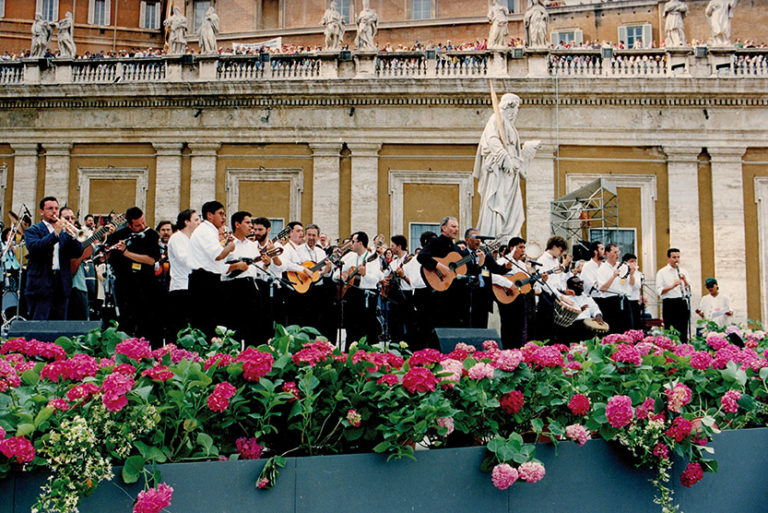
“We’re Very happy, Holy Father, because you have called us to give thank the Lord for the wonderful gifts of apostolate, of the evangelization, holiness, love, that the Holy Spirit is raising up in the Church, as a result of the Council, to prepare it for the evangelization of the secularized world, to make it capable of carrying out the New Evangelization.
Thank you for the opportunity offered to me to thank God in front of Peter and with me all these brothers, that for the most part were far from the Church. For fear of Death they lived, like me, slaves of the devil, as the Letter to the Hebrews says (cf. Heb 2, 14-15). But God has sent his Son to free us. Christ, with his death and resurrection, has taken away the power to the devil. Risen and ascended to heaven, he presents to the Father his wounds for all men, and he sends us the Holy Spirit. Thus, the Spirit testifies to our spirit that we are children of God (cf. Rom 8:16), men saved from the power of sin and death, saved from the seduction of the flesh and delusions of the world, but above all of the condemnation of seeking ourselves in everything. He, Christ, has made us partakers of its nature. We can love as He has loved us. to love beyond death, because he gives us his life, he gives us eternal life.
But how do you bring this immense richness to all men, we need a new language on a journey that can gestate the divine life? Here is the Neocatechumenal Way. God has sent me and Carmen Hernández, to live among the poor. I would also like Carmen to join me for a moment (calls Carmen: Carmen, come here, come here). The Lord has sent us to live among the poor, where, together with the most miserable, he has made us find a synthesis of preaching, a kerygma in the rediscovery of the Paschal Mystery in a living liturgy that transforms people’s lives, and most of all makes the small Christian community appear. All starting from Second Vatican Council. We are an instrument to help bringing the renewal of the Council to the parishes. Because it was the Council, we think, the response of the Holy Spirit to the challenges of the Third Millennium, especially the challenge of secularization.
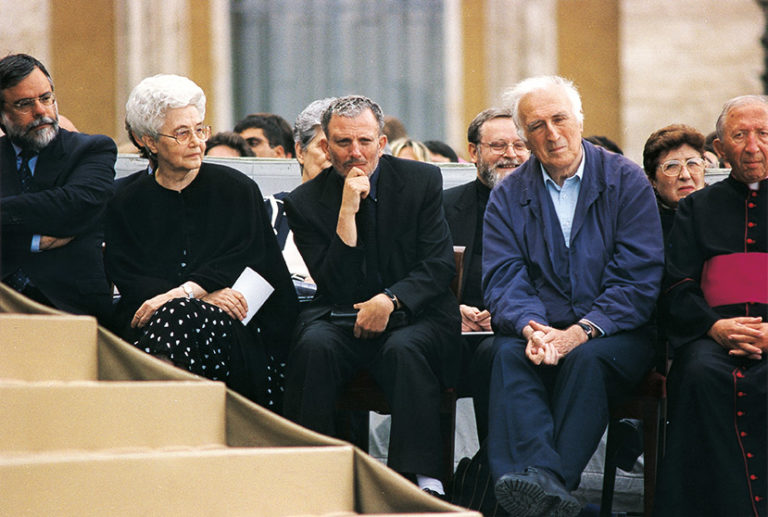
You, Holy Father, at the symposium of the European bishops, after having spoken of the secularization that destroys the family, said to the bishops in 1985: “The Holy Spirit has already responded to this challenge, it has already raised the answer. Because it is Christ who saves his Church ”. He invited the bishops to look for the signs where the Holy Spirit was already blowing. He said that a New Evangelization was urgent, inspired by the “very first apostolic model”. Then, too, there was a unification of culture, the “pax romana” had unified the Mediterranean world: a single language, a single culture, which has allowed the early Church to expand rapidly. Well, Holy Father, see this square, full of so many brothers. See how many ecclesial realities: his words from thirteen years ago have been prophetic. Here is the breath of the Holy Spirit who wants to help renew your Church! To evangelize contemporary man, you need signs that call you to faith. Christ says: “love each other as I have loved you and the world will know that you are my disciples (cf. Jn 13,34-35)”, be perfectly one and the world will believe (cfr. Jn 17,21). But we ask: where, in our parishes, is this stature of faith found, that it can be made a sacrament, a sign, for secularized man? Where is this love for the enemy made visible, as Christ loved us when we were his enemies? (cf. Rom 5,8-10).
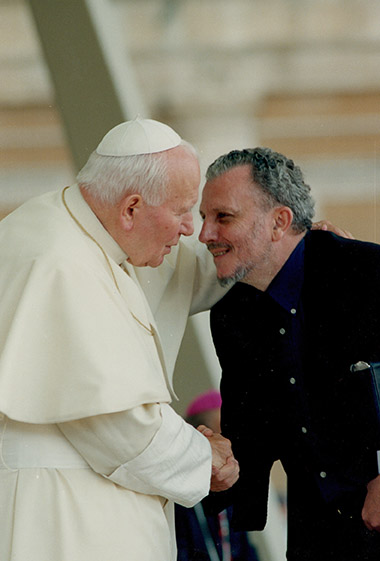
The Neocatechumenal Way also wants to be, like so many other ecclesial realities, an itinerary in the parishes to make the baptismal faith grow, and to form Christian communities that make Christ’s love visible to all men, a new love, a true novelty for the world, love of the enemy, love in the dimension of the Cross.To reach this stature of faith, we say that we have to make small communities like the Holy Family of Nazareth, where the Baptism we have received can grow, as has happened to the Son of God, who has needed a community to grow as a man and become an adult. It is necessary that our faith becomes adult and can give signs to modern man. Your Holiness, we have seen enormous fruits emerge in this journey of faith: families rebuilt , families open to life with more than six-seven children, also nine children, so many young people saved from drugs, thousands of vocations for seminaries and for consecrated and contemplative life, families that offer themselves to evangelize in the most difficult areas. All this would not have been possible without the help of the bishops, but above all, without the help of Peter. Peter! The first time Paul VI has seen us, he has defended us from so many accusations, saying: “You do after Baptism what the early Church did before Baptism.” And he adds: “before or after is secondary, the important thing is that you look at authenticity, at the fullness of the Christian life and this is great merit that comforts us enormously” (Paul VI, Address to the Neocatechumenal Communities in the Hearing of May 8, 1974).
But above all, you, Holiness, visiting the parishes of Rome, more than two hundred times have spoken to us with so much courage, sending families, encouraging us to open “Redemptoris Mater” seminars. You, confirming us, helping us, walking with us, accepting to be photographed with each family sent on mission, so that everyone knew that they were families sent by the Pope, helping us with the liturgy, coming yourself to celebrate the Eucharist with us, to encourage all the bishops and above all, recognizing the Way, in his letter to Bishop Cordes, saying: “I recognize the Neocatechumenal Way as an itinerary of Catholic formation, valid for current times and for the man of today” (John Paul II, Letter “Ogniqualvolta” to Bishop Paul Josef Cordes, August 30, 1990). I end by saying: Your Holiness, continue helping us, because this work exceeds us immensely and we feel very poor, useless servants, worse still, total impediment! Without Pedro we could not go on. Thanks for everything”.
We review the speech of the Holy Father John Paul II to the five hundred thousand people belonging to the ecclesial movements and the New Communities that -in the afternoon of Saturday, May 30- they have participated in the Plaza de San Pedro in the exceptional meeting:“Suddenly a sound came from heaven like the rush of a mighty wind, and it filled all the house where they were sitting. And there appeared to them tongues as of fire, distributed and resting on each one of them. And they were all filled with the Holy Spirit” (Acts 2:2-3)
Dear Brothers and Sisters,
1. With these words the Acts of the Apostles bring us into the heart of the Pentecost event; they show us the disciples, who, gathered with Mary in the Upper Room, receive the gift of the Spirit. Thus Jesus’ promise is fulfilled and the time of the Church begins. From that time the wind of the Spirit would carry Christ’s disciples to the very ends of the earth. It would take them even to martyrdom for their fearless witness to the Gospel.
It is as though what happened in Jerusalem 2,000 years ago were being repeated this evening in this square, the heart of the Christian world. Like the Apostles then, we too find ourselves gathered in a great upper room of Pentecost, longing for the outpouring of the Spirit. Here we would like to profess with the whole Church “the same Spirit … the same Lord … the same God who inspires them all in everyone” (1 Cor 12:4-6). This is the atmosphere we wish to relive, imploring the gifts of the Holy Spirit for each of us and for all the baptized people
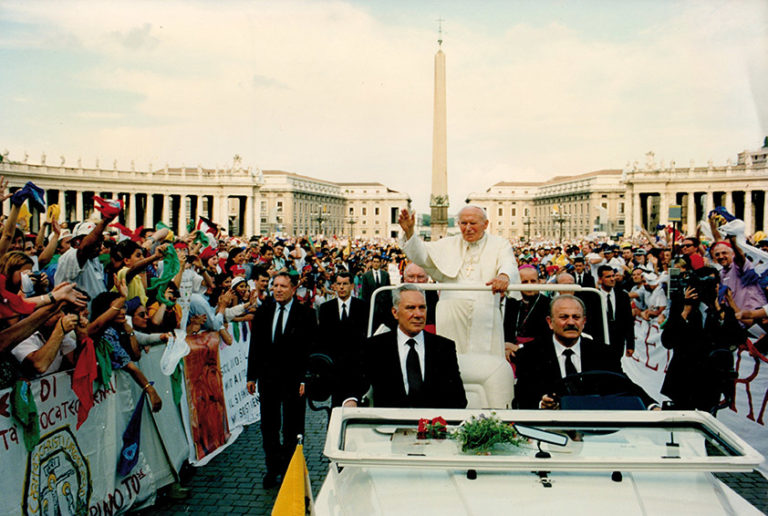
2. I greet and thank Cardinal James Francis Stafford, President of the Pontifical Council for the Laity, for the words he has wished to address to me, also in your name, at the beginning of this meeting. With him I greet the Cardinals and Bishops present. I extend an especially grateful greeting to Chiara Lubich, Kiko Arguello, Jean Vanier and Mons. Luigi Giussani for their moving testimonies. With them, I greet the founders and leaders of the new communities and movements represented here. Lastly, I wish to address each of you, brothers and sisters who belong to the individual ecclesial movements. You promptly and enthusiastically accepted the invitation I addressed to you on Pentecost 1996, and have carefully prepared yourselves, under the guidance of the Pontifical Council for the Laity, for this extraordinary meeting which launches us towards the Great Jubilee of the Year 2000.
Today’s event is truly unprecedented: for the first time the movements and new ecclesial communities have all gathered together with the Pope. It is the great “common witness” I wished for the year which, in the Church’s journey to the Great Jubilee, is dedicated to the Holy Spirit. The Holy Spirit is here with us! It is he who is the soul of this marvellous event of ecclesial communion. Truly, “this is the day which the Lord has made; let us rejoice and be glad in it” (Ps 117:24).
3. In Jerusalem, almost 2,000 years ago, on the day of Pentecost, before an astonished and mocking crowd, due to the unexplainable change observed in the Apostles, Peter courageously proclaims: “Jesus of Nazareth, a man attested to you by God … you crucified and killed by the hands of lawless men. But God raised him up” (Acts 2:22-24). Peter’s words express the Church’s selfawareness, based on the certainty that Jesus Christ is alive, is working in the present and changes life.
The Holy Spirit, already at work in the creation of the world and in the Old Covenant, reveals himself in the Incarnation and the Paschal Mystery of the Son of God, and in a way “bursts out” at Pentecost to extend the mission of Christ the Lord in time and space. The Spirit thus makes the Church a stream of new life that flows through the history of mankind.
4. With the Second Vatican Council, the Comforter recently gave the Church, which according to the Fathers is the place “where the Spirit flourishes” (Catechism of the Catholic Church, n. 749), a renewed Pentecost, instilling a new and unforeseen dynamism.
Whenever the Spirit intervenes, he leaves people astonished. He brings about events of amazing newness; he radically changes persons and history. This was the unforgettable experience of the Second Vatican Ecumenical Council during which, under the guidance of the same Spirit, the Church rediscovered the charismatic dimension as one of her constitutive elements: “It is not only through the sacraments and the ministrations of the Church that the Holy Spirit makes holy the people, leads them and enriches them with his virtues. Allotting his gifts according as he wills (cf. 1 Cor 12:11), he also distributes special graces among the faithful of every rank…. He makes them fit and ready to undertake various tasks and offices for the renewal and building up of the Church” (Lumen gentium, n.12).
The institutional and charismatic aspects are co-essential as it were to the Church’s constitution. They contribute, although differently, to the life, renewal and sanctification of God’s People. It is from this providential rediscovery of the Church’s charismatic dimension that, before and after the Council, a remarkable pattern of growth has been established for ecclesial movements and new communities.
5. Today the Church rejoices at the renewed confirmation of the prophet Joel’s words which we have just heard: “I will pour out my Spirit upon all flesh” (Acts 2:17). You, present here, are the tangible proof of this “outpouring” of the Spirit. Each movement is different from the others, but they are all united in the same communion and for the same mission. Some charisms given by the Spirit burst in like an impetuous wind, which seizes people and carries them to new ways of missionary commitment to the radical service of the Gospel, by ceaselessly proclaiming the truths of faith, accepting the living stream of tradition as a gift and instilling in each person an ardent desire for holiness.
Today, I would like to cry out to all of you gathered here in St Peter’s Square and to all Christians: Open yourselves docilely to the gifts of the Spirit! Accept gratefully and obediently the charisms which the Spirit never ceases to bestow on us! Do not forget that every charism is given for the common good, that is, for the benefit of the whole Church.
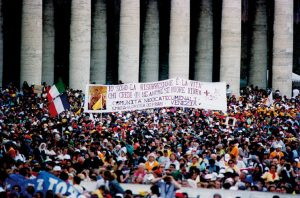
6. By their nature, charisms are communicative and give rise to that “spiritual affinity between persons” (Christifideles laici, n. 24) and that friendship in Christ which is the origin of “movements”. The passage from the original charism to the movement happens through the mysterious attraction that the founder holds for all those who become involved in his spiritual experience. In this way movements officially recognized by ecclesiastical authority offer themselves as forms of self-fulfilment and as reflections of the one Church. Their birth and spread has brought to the Church’s life an unexpected newness which is sometimes even disruptive. This has given rise to questions, uneasiness and tensions; at times it has led to presumptions and excesses on the one hand, and on the other, to numerous prejudices and reservations. It was a testing period for their fidelity, an important occasion for verifying the authenticity of their charisms. Today a new stage is unfolding before you: that of ecclesial maturity. This does not mean that all problems have been solved. Rather, it is a challenge. A road to take. The Church expects from you the “mature” fruits of communion and commitment.
7. In our world, often dominated by a secularized culture which encourages and promotes models of life without God, the faith of many is sorely tested, and is frequently stifled and dies. Thus we see an urgent need for powerful proclamation and solid, in-depth Christian formation. There is so much need today for mature Christian personalities, conscious of their baptismal identity, of their vocation and mission in the Church and in the world! There is great need for living Christian communities! And here are the movements and the new ecclesial communities: they are the response, given by the Holy Spirit, to this critical challenge at the end of the millennium. You are this providential response. True charisms cannot but aim at the encounter with Christ in the sacraments. The ecclesial realities to which you belong have helped you to rediscover your baptismal vocation, to appreciate the gifts of the Spirit received at Confirmation, to entrust yourselves to God’s forgiveness in the sacrament of Reconciliation and to recognize the Eucharist as the source and summit of all Christian life. Thanks to this powerful ecclesial experience, wonderful Christian families have come into being which are open to life, true “domestic churches”, and many vocations to the ministerial priesthood and the religious life have blossomed, as well as new forms of lay life inspired by the evangelical counsels. You have learned in the movements and new communities that faith is not abstract talk, nor vague religious sentiment, but new life in Christ instilled by the Holy Spirit.
8. How is it possible to safeguard and guarantee a charism’s authenticity? It is essential in this regard that every movement submit to the discernment of the competent ecclesiastical authority. For this reason no charism can dispense with reference and submission to the Pastors of the Church. The Council wrote in clear words: “Those who have charge over the Church should judge the genuiness and proper use of these gifts, through their office not indeed to extinguish the Spirit, but to test all things and hold fast to what is good (cf. 1 Thes 5:12; 19-21)” (Lumen gentium, n. 12). This is the necessary guarantee that you are taking the right road!
In the confusion that reigns in the world today, it is so easy to err, to give in to illusions. May this element of trusting obedience to the Bishops, the successors of the Apostles, in communion with the Successor of Peter never be lacking in the Christian formation provided by your movements! You know the criteria for the ecclesiality of lay associations found in the Apostolic Exhortation Christifideles laici (cf. n. 30). I ask you always to adhere to them with generosity and humility, bringing your experiences to the local Churches and parishes, while always remaining in communion with the Pastors and attentive to their direction.
9. Jesus said: “I came to cast fire upon the earth; and would that it were already kindled!” (Lk 12:39). As the Church prepares to cross the threshold of the third millennium, let us accept the Lord’s invitation, so that his fire may spread in our hearts and in those of our brothers and sisters.
Today, from this upper room in St Peter’s Square, a great prayer rises: Come, Holy Spirit, come and renew the face of the earth! Come with your seven gifts! Come, Spirit of Life, Spirit of Communion and Love! The Church and the world need you. Come, Holy Spirit, and make ever more fruitful the charisms you have bestowed on us. Give new strength and missionary zeal to these sons and of daughters of yours who have gathered here. Open their hearts; renew their Christian commitment in the world. Make them courageous messengers of the Gospel, witnesses to the risen Jesus Christ, the Redeemer and Saviour of man. Strengthen their love and their fidelity to the Church.
Let us turn our gaze to Mary, Christ’s first disciple, Spouse of the Holy Spirit and Mother of the Church, who was with the Apostles at the first Pentecost, so that she will help us to learn from her fiat docility to the voice of the Spirit.
Today, from this square, Christ says to each of you: “Go into all the world and preach the gospel to the whole creation” (Mk 16:15). He is counting on every one of you, and so is the Church. “Lo”, the Lord promises, “I am with you always to the close of the age” (Mt 28:20).
I am with you. Amen!
(*) Cfr. «L’Osservatore Romano», 1-2 May 1998.